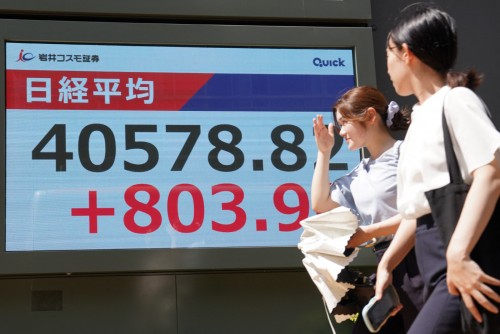 |
| Japan’s Nikkei index climbs on July 23 following the announcement of a U.S.-Japan tariff agreement. / Source: AFP-Yonhap News |
On July 23, Japan’s Nikkei index rose following the announcement of a U.S.-Japan tariff deal that lowers bilateral tariffs to 15%. Trade experts in South Korea are now urging Seoul to devise its own concession strategy as it faces a 24% tariff notice from Washington.
Japan reached the agreement after opening its markets to U.S. automobiles and rice. In return, the U.S. agreed to lower its previously imposed 25% tariff to 15%. Experts warn that Korea must now identify trade-offs of its own and proactively present negotiation cards to reduce its tariff burden.
“Japan lowered its car tariff to 12.5%, so we must negotiate for a rate even lower,” said Kim Tae-hwang, professor of international commerce at Myongji University. “Trump claimed the tariffs would be negotiated per product, but in reality, they weren’t.”
Following the deal, President Donald Trump wrote on social media, “The most important part is that Japan will open trade in cars, trucks, rice, and specific agricultural and other products. This deal will create hundreds of thousands of jobs, and nothing like it has been done before.”
Kim noted that Korea cannot match Japan’s investment scale: “Japan’s economy is more than three times the size of ours, and its population 2.5 times larger. Korea cannot commit to such investments, especially when the government has already issued national bonds to fund a 100-trillion won AI plan and public welfare coupons.” He also cast doubt on whether Japan would fulfill its full pledge of 760 trillion won in investment.
Korean trade authorities are currently preparing several options to negotiate exceptions or reductions to the 25% reciprocal tariff, as well as specific duties on cars (25%), and steel and aluminum (50%).
Washington, for its part, is asking Korea to ease non-tariff barriers, increase imports of U.S. energy and agricultural products, and relax digital regulations. Other demands reportedly include lifting the ban on U.S. beef over 30 months old, expanding rice market access, easing quarantine rules on fruit imports, and speeding up approval of genetically modified organisms (GMOs).
“We have the U.S.-Korea FTA and the shipbuilding sector as leverage,” Kim said. “If we expand our import volumes from the U.S. within the FTA framework, we can aim for a better outcome than Japan.”
Still, experts warn that the U.S. may not grant Korea the same concessions as Japan. Stephen Vaughn, former general counsel for the U.S. Trade Representative under Trump’s first term, said even increased Korean investment might not lead to tariff relief on its key exports.
Kim echoed the skepticism: “Korea has already made commitments through Hyundai Motor and Hyundai Steel, and previously through Samsung and SK Hynix under the Biden administration. But investments are made with expected returns. I don’t believe they’ll be seen as powerful bargaining chips.”
Most Read
-
1
-
2
-
3
-
4
-
5
-
6
-
7





















